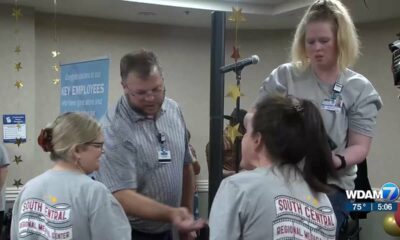Kaiser Health News
Whistleblower Accuses Aledade, Largest US Independent Primary Care Network, of Medicare Fraud
Fred Schulte, KFF Health News
Tue, 05 Mar 2024 10:00:00 +0000
A Maryland firm that oversees the nation's largest independent network of primary care medical practices is facing a whistleblower lawsuit alleging it cheated Medicare out of millions of dollars using billing software “rigged” to make patients appear sicker than they were.
The civil suit alleges that Aledade Inc.'s billing apps and other software and guidance provided to doctors improperly boosted revenues by adding overstated medical diagnoses to patients' electronic medical records.
“Aledade did whatever it took to make patients appear sicker than they were,” according to the suit.
For example, the suit alleges that Aledade “conflated” anxiety into depression, which could boost payments by $3,300 a year per patient. And Aledade decided that patients over 65 years old who said they had more than one drink per day had substance use issues, which could bring in $3,680 extra per patient, the suit says.
The whistleblower case was filed by Khushwinder Singh in federal court in Seattle in 2021 but remained under seal until January of this year. Singh, a “senior medical director of risk and wellness product” at Aledade from January 2021 through May 2021, alleges the company fired him after he objected to its “fraudulent course of conduct,” according to the suit. He declined to comment on the suit.
The case is pending and Aledade has yet to file a legal response in court. Julie Bataille, Aledade's senior vice president for communications, denied the allegations, saying in an interview that “the whole case is totally baseless and meritless.”
Based in Bethesda, Maryland, Aledade helps manage independent primary care clinics and medical offices in more than 40 states, serving some 2 million people.
Aledade is one of hundreds of groups known as accountable care organizations. ACOs enjoy strong support from federal health officials who hope they can keep people healthier and achieve measurable cost savings.
Aledade was co-founded in 2014 by Farzad Mostashari, a former health information technology chief in the Obama administration, and has welcomed other ex-government health figures into its ranks. In June 2023, President Joe Biden appointed Mandy Cohen, then executive vice president at Aledade, to head the Centers for Disease Control and Prevention in Atlanta.
Aledade has grown rapidly behind hundreds of millions of dollars in venture capital financing and was valued at $3.5 billion in 2023.
Mostashari, Aledade's chief executive officer, declined to be interviewed on the record.
“As this is an active legal matter, we will not respond to individual allegations in the complaint,” Aledade said in a statement to KFF Health News. “We remain focused on our top priority of delivering high-quality, value-based care with our physician partners and will defend ourselves vigorously if needed in a court of law.”
The lawsuit also names as defendants 19 independent physician practices, many in small cities in Delaware, Kansas, Louisiana, North Carolina, Pennsylvania, and West Virginia. According to the suit, the doctors knowingly used Aledade software to trigger illegal billings, a practice known in the medical industry as “upcoding.” None has filed an answer in court.
More than two dozen whistleblower lawsuits, some dating back more than a decade, have accused Medicare health plans of overcharging the government by billing for medical conditions not supported by patient medical records. These cases have resulted in hundreds of millions of dollars in penalties. In September 2023, Cigna agreed to pay $37 million to settle one such case, for instance.
But the whistleblower suit filed against Aledade appears to be the first to allege upcoding within accountable care organizations, which describe part of their mission as foiling wasteful spending. ACOs including Aledade made headlines recently for helping to expose an alleged massive Medicare fraud involving urinary catheters, for instance.
Finding the ‘Gravy'
Singh's suit targets Aledade's use of coding software and guidance to medical practices that joined its network. Some doctors treated patients on standard Medicare through the ACO networks, while others cared for seniors enrolled in Medicare Advantage plans, according to the suit.
Medicare Advantage is a privately run alternative to standard Medicare that has surged in popularity and now cares for more than 30 million people. Aledade has sought to expand its services to Medicare Advantage enrollees.
The lawsuit alleges Aledade encouraged doctors to tack on suspect medical diagnoses that paid extra money. Aledade called it finding “the gravy sitting in the [patient's] chart,” according to the suit.
The company “instructed” providers to diagnose diabetes with complications, “even if the patient's diabetes was under control or the complicating factor no longer existed,” according to the suit.
Some medical practices in Delaware, North Carolina, and West Virginia billed the inflated code for more than 90% of their Medicare Advantage patients with diabetes, according to the suit.
The lawsuit also alleges that Aledade “rigged” the software to change a diagnosis of overweight to “morbid obesity,” which could pay about $2,500 more per patient. Some providers coded morbid obesity for patients on traditional Medicare at 10 times the national average, according to the suit.
“This fraudulent coding guidance was known as ‘Aledade gospel,'” according to the suit, and following it “paid dividends in the form of millions of dollars in increased revenue.”
These tactics “usurped” the clinical judgment of doctors, according to the suit.
‘No Diagnosis Left Behind'
In its statement to KFF Health News, Aledade said its software offers doctors a range of data and guidance that helps them evaluate and treat patients.
“Aledade's independent physicians remain solely responsible for all medical decision-making for their patients,” the statement read.
The company said it will “continue to advocate for changes to improve Medicare's risk adjustment process to promote accuracy while also reducing unnecessary administrative burdens.”
In a message to employees and partner practices sent on Feb. 29, Mostashari noted that the Justice Department had declined to take over the False Claims Act case.
“We recently learned that the federal government has declined to join the case U.S. ex rel. Khushwinder Singh v. Aledade, Inc. et al. That's good news, and a decision we wholeheartedly applaud given the baseless allegations about improper coding practices and wrongful termination brought by a former Aledade employee three years ago. We do not yet know how the full legal situation will play out but will defend ourselves vigorously if needed in a court of law,” the statement said.
The Justice Department advised the Seattle court on Jan. 9 that it would not intervene in the case “at this time,” which prompted an order to unseal it, court records show. Under the false claims law, whistleblowers can proceed with the case on their own. The Justice Department does not state a reason for declining a case but has said in other court cases that doing so has no bearing on its merits.
Singh argues in his complaint that many “unsupported” diagnosis codes were added during annual “wellness visits,” and that they did not result in the patients receiving any additional medical care.
Aledade maintained Slack channels in which doctors could discuss the financial incentives for adding higher-paying diagnostic codes, according to the suit.
The company also closely monitored how doctors coded as part of an initiative dubbed “no diagnosis left behind,” according to the suit.
——————————
By: Fred Schulte, KFF Health News
Title: Whistleblower Accuses Aledade, Largest US Independent Primary Care Network, of Medicare Fraud
Sourced From: kffhealthnews.org/news/article/whistleblower-upcoding-medicare-aledade-lawsuit-aco-accountable-care/
Published Date: Tue, 05 Mar 2024 10:00:00 +0000
Kaiser Health News
The Lure of Specialty Medicine Pulls Nurse Practitioners From Primary Care
Michelle Andrews
Fri, 17 May 2024 09:00:00 +0000
For many patients, seeing a nurse practitioner has become a routine part of primary care, in which these “NPs” often perform the same tasks that patients have relied on doctors for.
But NPs in specialty care? That's not routine, at least not yet. Increasingly, though, nurse practitioners and physician assistants are joining cardiology, dermatology, and other specialty practices, broadening their skills and increasing their income.
This development worries some people who track the health workforce, because current trends suggest primary care, which has counted on nurse practitioners to backstop physician shortages, soon might not be able to rely on them to the same extent.
“They're succumbing to the same challenges that we have with physicians,” said Atul Grover, executive director of the Research and Action Institute at the Association of American Medical Colleges. The rates NPs can command in a specialty practice “are quite a bit higher” than practice salaries in primary care, he said.
When nurse practitioner programs began to proliferate in the 1970s, “at first it looked great, producing all these nurse practitioners that go to work with primary care physicians,” said Yalda Jabbarpour, director of the American Academy of Family Physicians' Robert Graham Center for Policy Studies. “But now only 30% are going into primary care.”
Jabbarpour was referring to the 2024 primary care scorecard by the Milbank Memorial Fund, which found that from 2016 to 2021 the proportion of nurse practitioners who worked in primary care practices hovered between 32% and 34%, even though their numbers grew rapidly. The proportion of physician assistants, also known as physician associates, in primary care ranged from 27% to 30%, the study found.
Both nurse practitioners and physician assistants are advanced practice clinicians who, in addition to graduate degrees, must complete distinct education, training, and certification steps. NPs can practice without a doctor's supervision in more than two dozen states, while PAs have similar independence in only a handful of states.
About 88% of nurse practitioners are certified in an area of primary care, according to the American Association of Nurse Practitioners. But it is difficult to track exactly how many work in primary care or in specialty practices. Unlike physicians, they're generally not required to be endorsed by a national standard-setting body to practice in specialties like oncology or cardiology, for example. The AANP declined to answer questions about its annual workforce survey or the extent to which primary care NPs are moving toward specialties.
Though data tracking the change is sparse, specialty practices are adding these advanced practice clinicians at almost the same rate as primary care practices, according to frequently cited research published in 2018.
The clearest evidence of the shift: From 2008 to 2016, there was a 22% increase in the number of specialty practices that employed nurse practitioners and physician assistants, according to that study. The increase in the number of primary care practices that employed these professionals was 24%.
Once more, the most recent projections by the Association of American Medical Colleges predict a dearth of at least 20,200 primary care physicians by 2036. There will also be a shortfall of non-primary care specialists, including a deficiency of at least 10,100 surgical physicians and up to 25,000 physicians in other specialties.
When it comes to the actual work performed, the lines between primary and specialty care are often blurred, said Candice Chen, associate professor of health policy and management at George Washington University.
“You might be a nurse practitioner working in a gastroenterology clinic or cardiology clinic, but the scope of what you do is starting to overlap with primary care,” she said.
Nurse practitioners' salaries vary widely by location, type of facility, and experience. Still, according to data from health care recruiter AMN Healthcare Physician Solutions, formerly known as Merritt Hawkins, the total annual average starting compensation, including signing bonus, for nurse practitioners and physician assistants in specialty practice was $172,544 in the year that ended March 31, slightly higher than the $166,544 for those in primary care.
According to forecasts from the federal Bureau of Labor Statistics, nurse practitioner jobs will increase faster than jobs in almost any other occupation in the decade leading up to 2032, growing by 123,600 jobs or 45%. (Wind turbine service technician is the only other occupation projected to grow as fast.) The growth rate for physician assistants is also much faster than average, at 27%. There are more than twice as many nurse practitioners as physician assistants, however: 323,900 versus 148,000, in 2022.
To Grover, of the AAMC, numbers like this signal that there will probably be enough NPs, PAs, and physicians to meet primary care needs. At the same time, “expect more NPs and PAs to also flow out into other specialties,” he said.
When Pamela Ograbisz started working as a registered nurse 27 years ago, she worked in a cardiothoracic intensive care unit. After she became a family nurse practitioner a few years later, she found a job with a similar specialty practice, which trained her to take on a bigger role, first running their outpatient clinic, then working on the floor, and later in the intensive care unit.
If nurse practitioners want to specialize, often “the doctors mentor them just like they would with a physician residency,” said Ograbisz, now vice president of clinical operations at temporary placement recruiter LocumTenens.com.
If physician assistants want to specialize, they also can do so through mentoring, or they can receive “certificates of added qualifications” in 10 specialties to demonstrate their expertise. Most employers don't “encourage or require” these certificates, however, said Jennifer Orozco, chief medical officer at the American Academy of Physician Associates.
There are a number of training programs for family nurse practitioners who want to develop skills in other areas.
Raina Hoebelheinrich, 40, a family nurse practitioner at a regional medical center in Yankton, South Dakota, recently enrolled in a three-semester post-master's endocrinology training program at Mount Marty University. She lives on a farm in nearby northeastern Nebraska with her husband and five sons.
Hoebelheinrich's new skills could be helpful in her current hospital job, in which she sees a lot of patients with acute diabetes, or in a clinic setting like the one in Sioux Falls, South Dakota, where she is doing her clinical endocrinology training.
Lack of access to endocrinology care in rural areas is a real problem, and many people may travel hundreds of miles to see a specialist.
“There aren't a lot of options,” she said.
——————————
By: Michelle Andrews
Title: The Lure of Specialty Medicine Pulls Nurse Practitioners From Primary Care
Sourced From: kffhealthnews.org/news/article/nurse-practitioners-trend-primary-care-specialties/
Published Date: Fri, 17 May 2024 09:00:00 +0000
Did you miss our previous article…
https://www.biloxinewsevents.com/clean-needles-save-lives-in-some-states-they-might-not-be-legal/
Kaiser Health News
Clean Needles Save Lives. In Some States, They Might Not Be Legal.
Ed Mahon, Spotlight PA and Sarah Boden, WESA
Fri, 17 May 2024 09:00:00 +0000
Kim Botteicher hardly thinks of herself as a criminal.
On the main floor of a former Catholic church in Bolivar, Pennsylvania, Botteicher runs a flower shop and cafe.
In the former church's basement, she also operates a nonprofit organization focused on helping people caught up in the drug epidemic get back on their feet.
The nonprofit, FAVOR ~ Western PA, sits in a rural pocket of the Allegheny Mountains east of Pittsburgh. Her organization's home county of Westmoreland has seen roughly 100 or more drug overdose deaths each year for the past several years, the majority involving fentanyl.
Thousands more residents in the region have been touched by the scourge of addiction, which is where Botteicher comes in.
She helps people find housing, jobs, and health care, and works with families by running support groups and explaining that substance use disorder is a disease, not a moral failing.
But she has also talked publicly about how she has made sterile syringes available to people who use drugs.
“When that person comes in the door,” she said, “if they are covered with abscesses because they have been using needles that are dirty, or they've been sharing needles — maybe they've got hep C — we see that as, ‘OK, this is our first step.'”
Studies have identified public health benefits associated with syringe exchange services. The Centers for Disease Control and Prevention says these programs reduce HIV and hepatitis C infections, and that new users of the programs are more likely to enter drug treatment and more likely to stop using drugs than nonparticipants.
This harm-reduction strategy is supported by leading health groups, such as the American Medical Association, the World Health Organization, and the International AIDS Society.
But providing clean syringes could put Botteicher in legal danger. Under Pennsylvania law, it's a misdemeanor to distribute drug paraphernalia. The state's definition includes hypodermic syringes, needles, and other objects used for injecting banned drugs. Pennsylvania is one of 12 states that do not implicitly or explicitly authorize syringe services programs through statute or regulation, according to a 2023 analysis. A few of those states, but not Pennsylvania, either don't have a state drug paraphernalia law or don't include syringes in it.
Those working on the front lines of the opioid epidemic, like Botteicher, say a reexamination of Pennsylvania's law is long overdue.
There's an urgency to the issue as well: Billions of dollars have begun flowing into Pennsylvania and other states from legal settlements with companies over their role in the opioid epidemic, and syringe services are among the eligible interventions that could be supported by that money.
The opioid settlements reached between drug companies and distributors and a coalition of state attorneys general included a list of recommendations for spending the money. Expanding syringe services is listed as one of the core strategies.
But in Pennsylvania, where 5,158 people died from a drug overdose in 2022, the state's drug paraphernalia law stands in the way.
Concerns over Botteicher's work with syringe services recently led Westmoreland County officials to cancel an allocation of $150,000 in opioid settlement funds they had previously approved for her organization. County Commissioner Douglas Chew defended the decision by saying the county “is very risk averse.”
Botteicher said her organization had planned to use the money to hire additional recovery specialists, not on syringes. Supporters of syringe services point to the cancellation of funding as evidence of the need to change state law, especially given the recommendations of settlement documents.
“It's just a huge inconsistency,” said Zoe Soslow, who leads overdose prevention work in Pennsylvania for the public health organization Vital Strategies. “It's causing a lot of confusion.”
Though sterile syringes can be purchased from pharmacies without a prescription, handing out free ones to make drug use safer is generally considered illegal — or at least in a legal gray area — in most of the state. In Pennsylvania's two largest cities, Philadelphia and Pittsburgh, officials have used local health powers to provide legal protection to people who operate syringe services programs.
Even so, in Philadelphia, Mayor Cherelle Parker, who took office in January, has made it clear she opposes using opioid settlement money, or any city funds, to pay for the distribution of clean needles, The Philadelphia Inquirer has reported. Parker's position signals a major shift in that city's approach to the opioid epidemic.
On the other side of the state, opioid settlement funds have had a big effect for Prevention Point Pittsburgh, a harm reduction organization. Allegheny County reported spending or committing $325,000 in settlement money as of the end of last year to support the organization's work with sterile syringes and other supplies for safer drug use.
“It was absolutely incredible to not have to fundraise every single dollar for the supplies that go out,” said Prevention Point's executive director, Aaron Arnold. “It takes a lot of energy. It pulls away from actual delivery of services when you're constantly having to find out, ‘Do we have enough money to even purchase the supplies that we want to distribute?'”
In parts of Pennsylvania that lack these legal protections, people sometimes operate underground syringe programs.
The Pennsylvania law banning drug paraphernalia was never intended to apply to syringe services, according to Scott Burris, director of the Center for Public Health Law Research at Temple University. But there have not been court cases in Pennsylvania to clarify the issue, and the failure of the legislature to act creates a chilling effect, he said.
Carla Sofronski, executive director of the Pennsylvania Harm Reduction Network, said she was not aware of anyone having faced criminal charges for operating syringe services in the state, but she noted the threat hangs over people who do and that they are taking a “great risk.”
In 2016, the CDC flagged three Pennsylvania counties — Cambria, Crawford, and Luzerne — among 220 counties nationwide in an assessment of communities potentially vulnerable to the rapid spread of HIV and to new or continuing high rates of hepatitis C infections among people who inject drugs.
Kate Favata, a resident of Luzerne County, said she started using heroin in her late teens and wouldn't be alive today if it weren't for the support and community she found at a syringe services program in Philadelphia.
“It kind of just made me feel like I was in a safe space. And I don't really know if there was like a come-to-God moment or come-to-Jesus moment,” she said. “I just wanted better.”
Favata is now in long-term recovery and works for a medication-assisted treatment program.
At clinics in Cambria and Somerset Counties, Highlands Health provides free or low-cost medical care. Despite the legal risk, the organization has operated a syringe program for several years, while also testing patients for infectious diseases, distributing overdose reversal medication, and offering recovery options.
Rosalie Danchanko, Highlands Health's executive director, said she hopes opioid settlement money can eventually support her organization.
“Why shouldn't that wealth be spread around for all organizations that are working with people affected by the opioid problem?” she asked.
In February, legislation to legalize syringe services in Pennsylvania was approved by a committee and has moved forward. The administration of Gov. Josh Shapiro, a Democrat, supports the legislation. But it faces an uncertain future in the full legislature, in which Democrats have a narrow majority in the House and Republicans control the Senate.
One of the bill's lead sponsors, state Rep. Jim Struzzi, hasn't always supported syringe services. But the Republican from western Pennsylvania said that since his brother died from a drug overdose in 2014, he has come to better understand the nature of addiction.
In the committee vote, nearly all of Struzzi's Republican colleagues opposed the bill. State Rep. Paul Schemel said authorizing the “very instrumentality of abuse” crossed a line for him and “would be enabling an evil.”
After the vote, Struzzi said he wanted to build more bipartisan support. He noted that some of his own skepticism about the programs eased only after he visited Prevention Point Pittsburgh and saw how workers do more than just hand out syringes. These types of programs connect people to resources — overdose reversal medication, wound care, substance use treatment — that can save lives and lead to recovery.
“A lot of these people are … desperate. They're alone. They're afraid. And these programs bring them into someone who cares,” Struzzi said. “And that, to me, is a step in the right direction.”
At her nonprofit in western Pennsylvania, Botteicher is hoping lawmakers take action.
“If it's something that's going to help someone, then why is it illegal?” she said. “It just doesn't make any sense to me.”
This story was co-reported by WESA Public Radio and Spotlight PA, an independent, nonpartisan, and nonprofit newsroom producing investigative and public-service journalism that holds power to account and drives positive change in Pennsylvania.
KFF Health News is a national newsroom that produces in-depth journalism about health issues and is one of the core operating programs at KFF—an independent source of health policy research, polling, and journalism. Learn more about KFF.
USE OUR CONTENT
This story can be republished for free (details).
——————————
By: Ed Mahon, Spotlight PA and Sarah Boden, WESA
Title: Clean Needles Save Lives. In Some States, They Might Not Be Legal.
Sourced From: kffhealthnews.org/news/article/clean-needles-syringe-services-programs-legal-gray-area-risk-pennsylvania/
Published Date: Fri, 17 May 2024 09:00:00 +0000
Kaiser Health News
Watch: John Oliver Dishes on KFF Health News’ Opioid Settlements Series
Fri, 17 May 2024 09:00:00 +0000
Opioid manufacturers, distributors, and retailers are paying tens of billions of dollars in restitution to settle lawsuits related to their role in the nation's overdose epidemic. A recent broadcast of “Last Week Tonight With John Oliver” examined how that money is being spent by state and local governments across the United States.
The segment featured reporting from the KFF Health News series “Payback: Tracking the Opioid Settlement Cash.” You can learn more about the issue and read our collection of articles by Aneri Pattani here.
——————————
Title: Watch: John Oliver Dishes on KFF Health News' Opioid Settlements Series
Sourced From: kffhealthnews.org/news/article/watch-john-oliver-kff-health-news-payback-opioid-settlements-series/
Published Date: Fri, 17 May 2024 09:00:00 +0000
-
SuperTalk FM5 days ago
Martin Lawrence making 3 stops in Mississippi on comedy tour
-
Our Mississippi Home4 days ago
Beat the Heat with Mississippi’s Best Waterparks
-
Our Mississippi Home4 days ago
Charlie’s U-Pik: Opening Soon for the Summer Season
-
Mississippi News Video7 days ago
Local dentists offer free dental care in Amory
-
Kaiser Health News4 days ago
Medicaid ‘Unwinding’ Decried as Biased Against Disabled People
-
Mississippi News Video3 days ago
Jackson has a gang problem
-
SuperTalk FM15 hours ago
State auditor cracking down on Mississippians receiving unemployment benefits
-
Mississippi Today7 days ago
On this day in 1968







































